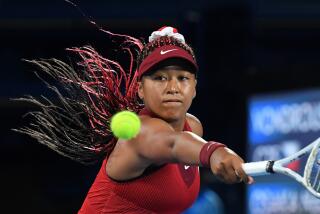Delayed honors
- Share via
NEW YORK -- They honored the daughter of a sharecropper at the U.S. Open, and a crowd of 23,000 that included many people with incomes resembling plantation owners stood and applauded.
Althea Gibson died four years ago at age 76. Monday night, the U.S. Tennis Assn. did its best to resurrect her.
They gave the moment and the ceremony context by gathering dozens of black women who had achieved greatness and “firsts.” They had a gospel-singing ensemble, a marching band from the Bronx that danced as well as marched. They had big-screen tributes from Dick Enberg, who told the audience that Gibson had “broken barriers and opened minds,” and from Mary Carillo, who said that, in Gibson’s playing days, “the tennis balls were white, the clothes were white and so were the tournaments.”
They had Phylicia Rashad speak in person and Bill Cosby on the big screen. And they brought out the incomparable Aretha Franklin to sing.
It was warm, it was fuzzy.
And it was probably too late.
It was also, in an entirely different sense, ironically timed.
In 1957, Gibson became the first American of African descent to win the United States tennis title. It was the U.S. Nationals at Forest Hills then, it is the U.S. Open at Flushing Meadows now. Monday night marked the 50th anniversary of her victory.
In 1950, Gibson was the first of her race to be allowed to enter the U.S. Nationals. The 50th anniversary of that was in 2000, when she was still alive and living nearby in Montclair, N.J. Her tennis barrier-breaking occurred only three years after Jackie Robinson had done a similar thing in baseball. That anniversary, as well as several of Robinson’s other landmark moments, were never missed by baseball or society.
If the USTA missed on that one, there were mitigating factors.
By most reports, Gibson was quiet, dignified and uncomfortable in the spotlight. In 1997, when the USTA opened the current 23,000-seat stadium and named it in honor of a black man, Arthur Ashe, Gibson was invited to attend by the USTA and declined. In 2002, at the time of her 75th birthday that Aug. 25, she was invited again, and declined again. By that time, the main issue was more declining health than it was dislike of the spotlight.
It may have been even more complicated than that.
Zina Garrison, who was honored here as the first black woman to win an Olympic medal in tennis, a gold in women’s doubles in 1988 in Seoul with Pam Shriver, knew Gibson and talked to her often. Garrison said that Gibson declined recent invitations by the USTA “because her health wasn’t the best, and by then it was just too late.”
That implied that there was a time when it wasn’t too late.
Garrison also said that Gibson, who left South Carolina at age 2 with her parents and came to live in Harlem, “died a little bit bitter.”
The implication was that the bitterness was over not getting her due, not being treated like somebody who had broken down racial barriers and won five Grand Slam singles titles.
So the USTA, in its new era of opening-night ceremonials, tried its best to make good. If they swung and missed in 2000, this time they hit a mulligan 280 yards down the middle. That was pushed partially by Gibson’s overwhelming support from a panel of journalists that annually selects inductees into the U.S. Open Court of Champions. If the seed of a celebration wasn’t already there with the 50th anniversary, it certainly was after the Court of Champions vote.
Then, the USTA took a final masterful step by putting both Serena and Venus Williams out on the Ashe Stadium court for separate first-round matches, which, of course, each won. There could be no clearer message and tribute. Here were two black stars who have prospered mightily by the trickle-down of inclusion that began that day in 1950 when Althea Gibson got to play with the big boys. More specifically, with the white women.
Then, there is the ironic timing.
Garrison told an interesting story. She said that, when she was 15, she went to a camp run by Gibson for African American players who had pro tour potential. At that camp, Gibson told her she wasn’t certain she would make it because “I didn’t work hard enough.”
Garrison said she went home, thought about it for two weeks, decided she wanted it, and set out to do the work needed.
Juxtapose that with Monday night.
They opened a tournament that will pay the women’s winner $1.4 million, from a field of 128 women who, currently, are most notable for playing abbreviated schedules, calling trainers for ticky-tack injuries, defaulting frequently and pulling out of tournaments after tickets have been sold based on their announced presence.
And they did so by honoring a woman who preached and practiced hard work, died with little money and, until Monday night, limited honor.
Interesting, isn’t it?
--
Bill Dwyre can be reached at bill.dwyre@latimes.com. For previous columns by Dwyre, go to latimes.com/dwyre.
More to Read
Go beyond the scoreboard
Get the latest on L.A.'s teams in the daily Sports Report newsletter.
You may occasionally receive promotional content from the Los Angeles Times.











